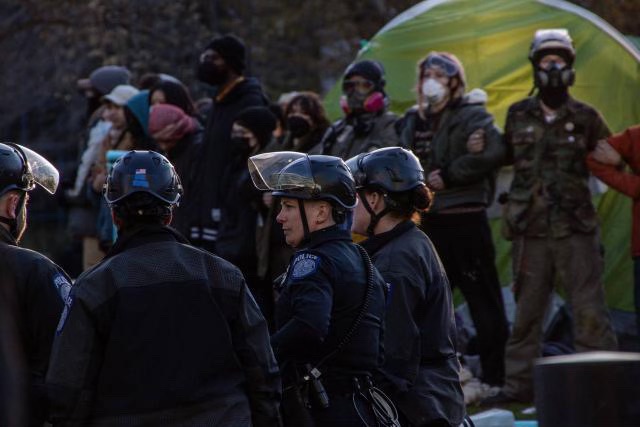
Photo courtesy of Julien Davis
Perspectives from Palestine Protests: Students speak-out against university repression
Jacob Downey
He/Him
Editor-in-Chief
4/29/24
In Boston, Emerson College students were arrested in March for protesting the college’s “silence on the ongoing genocide in Gaza” during the inauguration of President Jay Bernhardt.
The student body would receive a pseudo-conciliatory email prioritizing care and acknowledging the many strong and conflicting emotions felt by the community. “…We are committed to working together toward a shared understanding,” it read. On April 14, Students for Justice in Palestine set up the “Popular University” encampment at 2 Boylston Place. Emerson College would respond in force, leading to the arrest of 118 students.
Universities around the country have seen a rise in protests as students demand their tuition dollars be divested from Israel’s ongoing genocide in Palestine. Throughout April violent reactions to these otherwise peaceful demonstrations have become more frequent.

Concurrent with efforts at Emerson, North Eastern students set up a similar encampment on their campus. PSU alumni and North Eastern law student Julien Davis ‘22 spent April 26 camped out before moving toward supporting arrested students through the weekend.
Davis shared that the situation was tense with all of the police around but that the encampment itself was almost tranquil. “It was like it felt a little bit like the eye in the storm, if that makes sense,” he said, “it’s just a lot of students who are really passionate about promoting human rights. [People] who are really willing not only TO stand up for this cause and come out and do all this but to help each other.”
He hopes to see more people engage with the protesters and their perspectives rather than just the commentary thereon. He described a situation in which a counter-protester screamed “something along the lines of kill all the Jews” trying to incite the protesters to engage in similar hate speech. “Of course, the protesters at the encampment were silent. because they’re not anti-symmetric,” He said, “But nonetheless, news articles are spinning that to say that the reason why Northeastern called and BPD does like shut the whole thing down.” This is not a phenomenon unique to North Eastern.
Protests at Yale have garnered similar reactions. Yale Free Press Editor-in-Chief Sahar Tartak claimed a protester stabbed her in her left eye with a Palestinian flag. A video of the incident posted by Tartak has been widely scrutinized online despite publications like The New York Post and FOX News using it as an opportunity to condemn the protests as a whole.
At the University of New Hampshire, the Palestine Solidarity Coalition has been organizing since November. The group has been responsible for ceasefire resolutions in towns throughout the state. Organizer Adeena Ahsan has used her position in the Graduate Student Senate to pass a similar resolution. The undergrad senate considered the issue too political, according to Ahsan.
UNH admin has echoed this politicization, telling WMUR that they do not want to use the endowment to promote social or political change, despite their divestment from fossil fuels and organizations affiliated with the People’s Republic of China.
On April 25, PSC rallied with Southern NH for Palestine and the Party For Socialism and Liberation NH to pressure the school into divesting the university’s $475 million endowment from companies producing war materials. Though the funds from this endowment are used to support the university and its students, Ahsan is stalwart in her belief that “You can divest and invest in other profitable causes that are ethical. Our education, research, and all these essential services should not be dependent on war.”
Ahsan sees the increase in repression of student voices as proof of the cause gaining momentum. When the state sends in riot police, state troopers, and snipers, that means that students have shaken these institutions to their core, she said. She urges students to use whatever platforms they have to spread awareness of Palestinian liberation and begin forming communities and organizing at home.
At Plymouth, infographics spread like wildfire but little is done offline. A PSU extension of PSC was formed in March but has yet to do much outside of scattered Instagram posts. Organizer Violet Lempke has met with like-minded community members to work more closely with PSC and raise funds for the Palestinian Children’s Relief Fund. “I think it is really easy to get bogged down in all of the things we can’t change but apathy is the biggest weapon against us all,” she said. Lempke hopes to see the group be more active in the Fall.